What makes boring poetry boring?
I posted this question on facebook: ‘What makes boring poetry boring?’
People responded with a variety of reasons: no imagination, using tired techniques, failure to innovate, failure to obscure, the smack of phoniness, being too safe, being edgy for the sake of being edgy, cliches, the culture of commodification, not making an emotional connection. All of these make sense. All of these are different.
Want For Lion by Paige Taggart
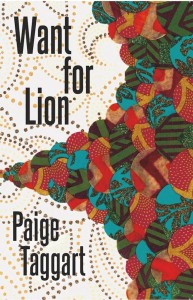 Want For Lion
Want For Lion
by Paige Taggart
Trembling Pillow Press, 2014
116 pages / $16 Buy from Trembling Pillow Press or Amazon
“I’ve always demanded more from a sunset,” says Charlotte Gainsbourg in Lars Van Trier’s Nymph()maniac. ‘Sunset’ being beauty at a distance, untouchable object of desire, lion in a cage. Gainsbourg’s character wants to throw punches, to participate in beauty’s creation. No way to interact with a sunset other than blind admiration. No way to intensify pleasure, or ruin it.
Paige Taggart shares this relationship to beauty. It’s not beauty until you draw blood. In Want For Lion, she wages war on meticulousness, employing a poetics of action, a space where beauty stems from ambition and the art of mistake-making. “There are rooms for mistakes, that shit is human, and land, and plant. Like a quilt of gold floating down the river.”
Beauty is not striking a golden pose, but falling well. I recently fell of my bike, completely unprompted, in the middle of a four way intersection, all the cars stopped at the red. A pedestrian asked if I was hurt, shaking his head, holding in laughter. I waved, “Only my pride!” How beautiful could my fall have been had I been wrapped in a quilt of gold?
*
In the section “Starts with Herds,” Taggart starts three poems with the same phrase, each time breaking it differently:
care about nothing
then care about everything
–
care about nothing then
care about everything
–
care about
nothing
then care
about everything
September 12th, 2014 / 10:00 am
Virtual Book Tour: Désirée Zamorano

Mercy Amado has raised three girls, protecting them from their cheating father by leaving him. But Mercy’s love can only reach so far when her children are adults, as Sylvia, Celeste, and Nataly must make their own choices to fight or succumb, leave or return, to love or pay penance. When tragedy strikes in Sylvia’s life, Mercy, Celeste, and Nataly gather support her, but their familial love may not be enough for them to remain close as the secrets in their histories surface. Forgiveness may not be accepted. Fiercely independent, intelligent, they are The Amado Women.
Today is the last stop of Désirée Zamorano’s virtual book tour celebrating her new novel. Below, read a bit about Désirée’s life as a writer, one that should not be chosen lightly.
More years ago than I care to admit I sat at a Bouchercon (mystery) conference and listened to the writer Patricia Sprinkle speak about the “seasons” in a writer’s life. I had two small children, taught 5th grade, and had committed myself to carve time out of my day to write. But, I had given myself a daily quota that I was daily unable to make. Ms. Sprinkle’s presentation reminded me that there would be different seasons in my life and to not beat myself up for being unable to make my arbitrary quotas. I took her words in, deeply.
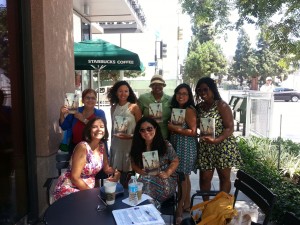
For decades I had one dream: to have a traditionally published novel that I could find on the shelves of a bookstore or library. Ten years ago, overwhelmed by unrealized dreams, and by what seemed like vain hopes and years’ worth of hours of writing (all these words—to what purpose?), I remember lying in bed and praying for God to excise this writing aspiration from my heart. Instead, I found a book that saved my artist’s soul: Making a Literary Life by Carolyn See.
Today is a very different time. Right now, I feel like the poster child for perseverance. When Cinco Puntos accepted my book, which would realize my dream, I released all the bitterness and resentment of my pre-published life. And I realized how ridiculous I had been, all these many years, to allow one thing to define me. One. How ludicrous. What, as they say in the psychology biz, a cognitive distortion. I wouldn’t wish it on my nemesis. Well, maybe.
Notes from Max Feller’s Notebooks
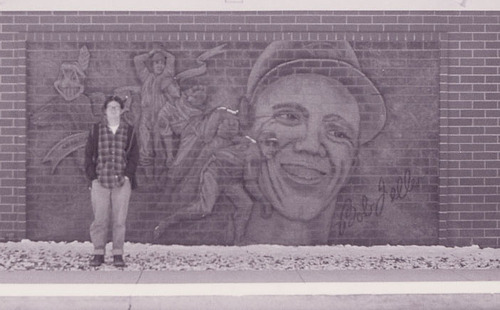
(Pictured is the author at the Bob Feller Museum in Van Meter, Iowa, back when he was younger and thinner.)
Like many of you, I still have friends in Iowa. And like many of you, I miss them very much. I’m only human. Like many of you.
My Iowa friend Eli likes to go to estate sales. He likes to buy old furniture. Most of all, he likes things that are old and made out of wood and have drawers. He often buys the things that are old and made out of wood and have drawers without first opening the drawers to see what is in them. He’s only human. Like many of you.
Recently he bought a bureau. In the bureau he found some notebooks. Eli doesn’t like notebooks.
Or, actually, Eli likes notebooks okay. But Eli likes things that are old and made out of wood and have drawers. And Eli knows that most of all, I like notebooks. And Eli likes me. So Eli sent me some notebooks.
25 Points: New Tab
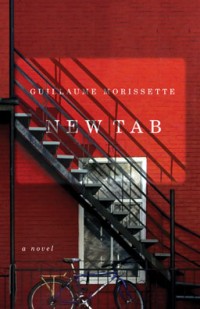 |
New Tab
by Guillaume Morissette
Véhicule Press, 2014
224 pages / $19.95 buy from Véhicule Press or Amazon
|
1. Morissette’s second full-length is set in a hip neighborhood in Montreal. Characters drink cheap beer, ignore their parents, promote cinema.
2. As an American, the most striking cultural moment in this Canadian novel was when two of the characters discussed, without guilt, never having seen The Shawshank Redemption.
3. New Tab tells the story of roommates born on Craigslist—their complex negotiations with landlords, utility companies, each other.
4. The narrator Thomas, a writer in his 20s, sulks through a dayjob designing video games for palmheld devices. At night he sneaks beers into dance clubs and hosts house parties. He attends a Creative Writing Program where he befriends the hard-partying, socially uninhibited Shannon. He falls in love with Romy, a walking distressed sweatshirt. Recalling a breakup conversation with Romy to Shannon, Thomas admits: “it’s like we were talking about golf.”
5. While reading this novel I kept thinking of my mother: Girls grow up faster than boys do.
6. New Tab is a page-turner.
7. I read it on vacation. I also read other books. I kept swiping out of those books to get back to New Tab.
8. I read on beer-stained hammocks and undercrowded chicken buses. I read in a colorful doorway and at a taco bar where body-obsessed Australians were puking up cheladas. I wanted to read New Tab when I couldn’t digest soccer. Like on July 4th during a long lunch when it took me the whole meal to realize Germany was in brown and the French were in black.
9. Morissette has a considerable talent for dialogue, and by that I mean everyone is written the same way.
10. I was eager to read New Tab after reading Morissette’s first book, I Am My Own Betrayal. I remember being deeply moved by this thought in the poem “Vaster Emptiness Achieved”:
We write poetry, people hate us, do we really have to hate each other also?
September 9th, 2014 / 1:46 pm
More Surface: Androgynous and Ambidextrous
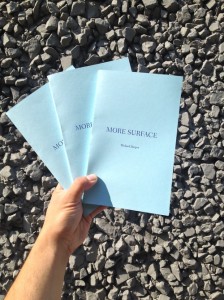 More Surface
More Surface
by Michael Harper
Snoot Books
$10 / Buy from Snoot Books
Leaving poetry readings with my women writer friends, it is not unusual to hear gripes from certain Betty Friedans among us about the Old Boys’ Club of Portland Poets, the Old Boys’ Club of Literature, of the Galaxy, etc. When I hear these statements, I usually reside in a state of polite ambivalence—what would we like these men writers to do, begin their reading with a formal acknowledgement of their privileged white penis status? Well, this is exactly what Michael Harper did at the debut reading of his chapbook, More Surface, one summer rooftop night. Harper’s reading began with the chapbook’s first poem: “Growing Up With A Middle-Class White Penis.” This poem places the reader at a ground zero from which things, phenomena, feelings, etc. are both reported and questioned with an essential ruthlessness. For example, we move from lines like “the penis bones’ connected to the no-crying bone” to “But molting complacency is a naturally learned yearning.” One of my favorite lines from another Portland poet, Emily Kendal Frey, is: “Am I smart enough to be androgynous?” Well, Michael Harper’s poetry is that smart. More Surface exhibits a vast range of perception, voice, form and bravery.
Poems from the chapbook’s first section, “Utopiates,” wander through the device-laden, cyborgian streets of today’s consciousness—hashtags, buzzfeeds, instagram, a wasteland of apps. From “The Conjugation of Friendship:”
to make the ceiling of your bedroom look like stars
because looking at actual stars will make us feel
small & alone
Do you think anyone is staring up
at this same sky app as us?
I don’t know dear it’s not done loading
These lines expose the human needs and fears underpinning our reliance on, our addictions to, our devices. An actual starry sky that once incited wonder and awe, replaced by a technological rendition, a utopiate, that creates an illusion of control and significance. Along with dark humor, this piece possesses a simple sadness, an unabashed isolation: “I feel my hands/ are telephones.” This desire for connection expressed in casual language echoes poets like Frank O’Hara, his Lunch Poems. Works like “The Demollification of Waking” also transcend the “cavern of the cell phone” for the heights of the heart, but here the sentiment is bald and dark, of “migratory flocks of fear.” Fear of getting up in the morning, of staying in bed, fear of repeating past mistakes because what has even been learned:
eight years ago and have to do it
all again knowing just as much
as I don’t know now.
My fear builds an altar in the hearts of others
where I learn that the opposite of fear is losing yourself.
September 8th, 2014 / 10:00 am
Ashley Opheim
To view the collection in fullscreen, go here.
Bio: Ashley Opheim (Ashley Obscura) is the author of the poetry collection I Am Here. She lives in Montreal, where she is the founding editor of Metatron and co-director of the reading series This Is Happening Whether You Like It Or Not. She can be followed on Twitter @hologramrainbow.
What’s the longest you’ve gone from having a piece of writing accepted for publication by a journal and the piece actually being published? (I’m interested in journals only.) I’m pushing two years for one of my favorite poems :(
I closed Dianna’s post because the discussion wasn’t taking a positive turn, and I got annoyed. I’d like to personally thank Dianna for being a thoughtful and brave person.
Unrelated question: Should I get a puppy?

25 Points: Wish I Was Here
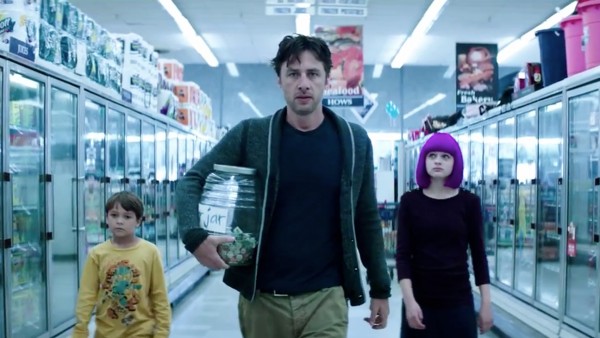
1. I cannot explain how excited I was to see this film. I watched Garden State and listened through the new soundtrack to prepare for, what I figured was going to be, an emotional experience.
2. The opening monologue was a little unnecessary. (I think he says the same damn thing, like, three times throughout the whole film.)
3. Zach Braff must be one of those “California Dads” who yell obscenities in front of their children, smoke weed in the drop off lane in front their kid’s school, is an unemployed “artist,” and is constantly having an existential crisis.
4. Zach Braff seems uncomfortable with being Jewish.
5. Things I didn’t expect to see in this film: Zach Braff masturbating.
6. This is the most attractive I’ve ever seen Kate Hudson.
7. Thought it was cool when I realized that Zach Braff’s son, Tucker, (played by Pierce Gagnon) is the “Rainmaker” from Looper. (How the hell did he get into this movie?)
8. Zach Braff clearly has daddy issues. (See Garden State for further evidence.)
9. Can’t believe Zach Braff doesn’t at least have a part-time job or something. His father pays for his children’s schooling, his wife brings home the bacon, and I guess Braff just sits there and studies his lines all day.
10. What I learned from this film: God doesn’t care about your dreams.
September 4th, 2014 / 2:26 pm
